数仓搭建DWD层
Posted 今夜月色很美
tags:
篇首语:本文由小常识网(cha138.com)小编为大家整理,主要介绍了数仓搭建DWD层相关的知识,希望对你有一定的参考价值。
1、数仓DWD层
1)对用户行为数据解析。
2)对业务数据采用维度模型重新建模。
2、DWD层(用户行为日志)
2.1、日志解析思路
(1)页面埋点日志
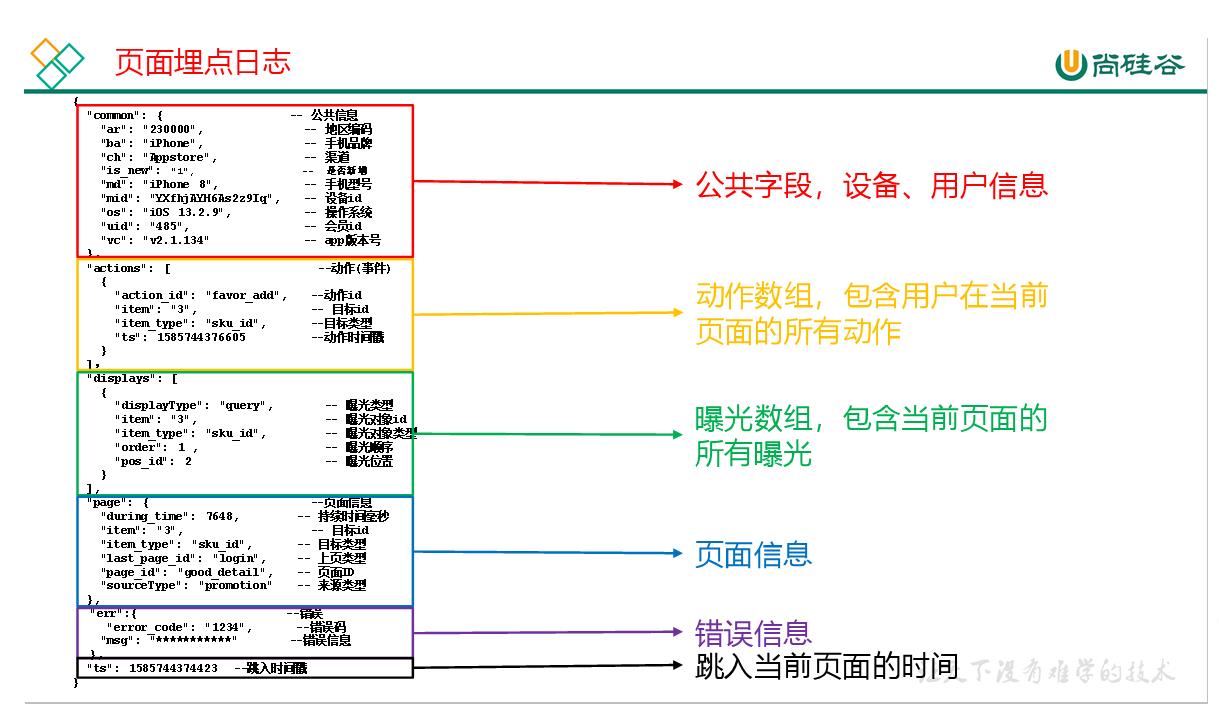
(2)启动日志
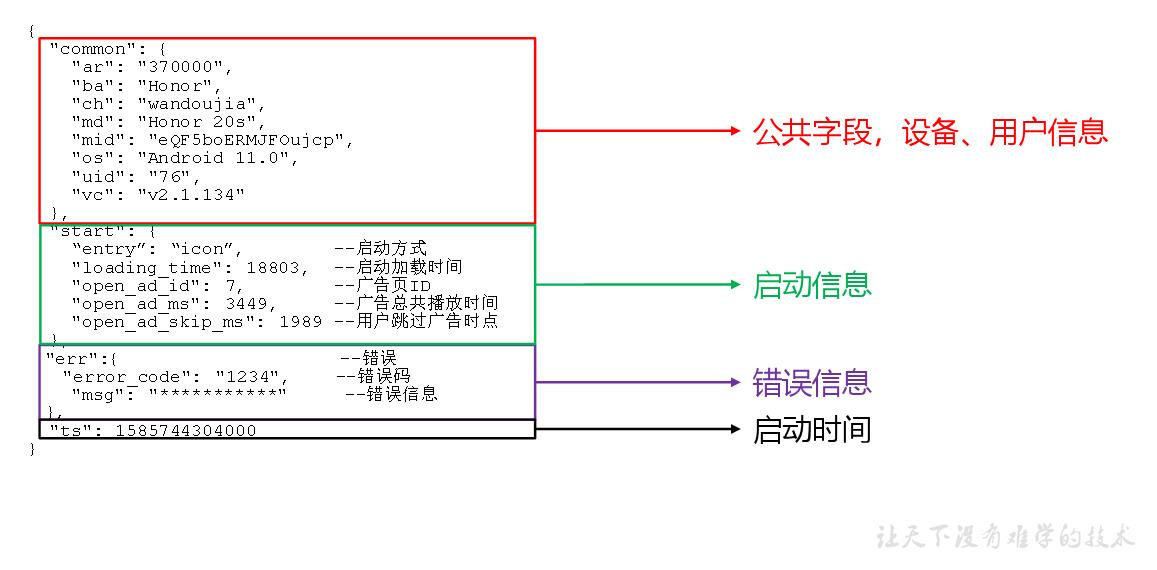
解析思路

2.2、get_json_object函数使用
1)数据
["name":"大郎","sex":"男","age":"25","name":"西门庆","sex":"男","age":"47"]
2)取出第一个json对象
hive (gmall)>
select get_json_object('["name":"大郎","sex":"男","age":"25","name":"西门庆","sex":"男","age":"47"]','$[0]');
3)取出第一个json的age字段的值
hive (gmall)>
SELECT get_json_object('["name":"大郎","sex":"男","age":"25","name":"西门庆","sex":"男","age":"47"]',"$[0].age");
结果是:25
2.3、启动日志表
启动日志解析思路:启动日志表中每行数据对应一个启动记录,一个启动记录应该包含日志中的公共信息和启动信息。先将所有包含start字段的日志过滤出来,然后使用get_json_object函数解析每个字段。
2.3.1、建表语句
DROP TABLE IF EXISTS dwd_start_log;
CREATE EXTERNAL TABLE dwd_start_log(
`area_code` STRING COMMENT '地区编码',
`brand` STRING COMMENT '手机品牌',
`channel` STRING COMMENT '渠道',
`is_new` STRING COMMENT '是否首次启动',
`model` STRING COMMENT '手机型号',
`mid_id` STRING COMMENT '设备id',
`os` STRING COMMENT '操作系统',
`user_id` STRING COMMENT '会员id',
`version_code` STRING COMMENT 'app版本号',
`entry` STRING COMMENT 'icon手机图标 notice 通知 install 安装后启动',
`loading_time` BIGINT COMMENT '启动加载时间',
`open_ad_id` STRING COMMENT '广告页ID ',
`open_ad_ms` BIGINT COMMENT '广告总共播放时间',
`open_ad_skip_ms` BIGINT COMMENT '用户跳过广告时点',
`ts` BIGINT COMMENT '时间'
) COMMENT '启动日志表'
PARTITIONED BY (`dt` STRING) -- 按照时间创建分区
STORED AS PARQUET -- 采用parquet列式存储
LOCATION '/warehouse/gmall/dwd/dwd_start_log' -- 指定在HDFS上存储位置
TBLPROPERTIES('parquet.compression'='lzo') -- 采用LZO压缩
;
2.3.2、数据导入
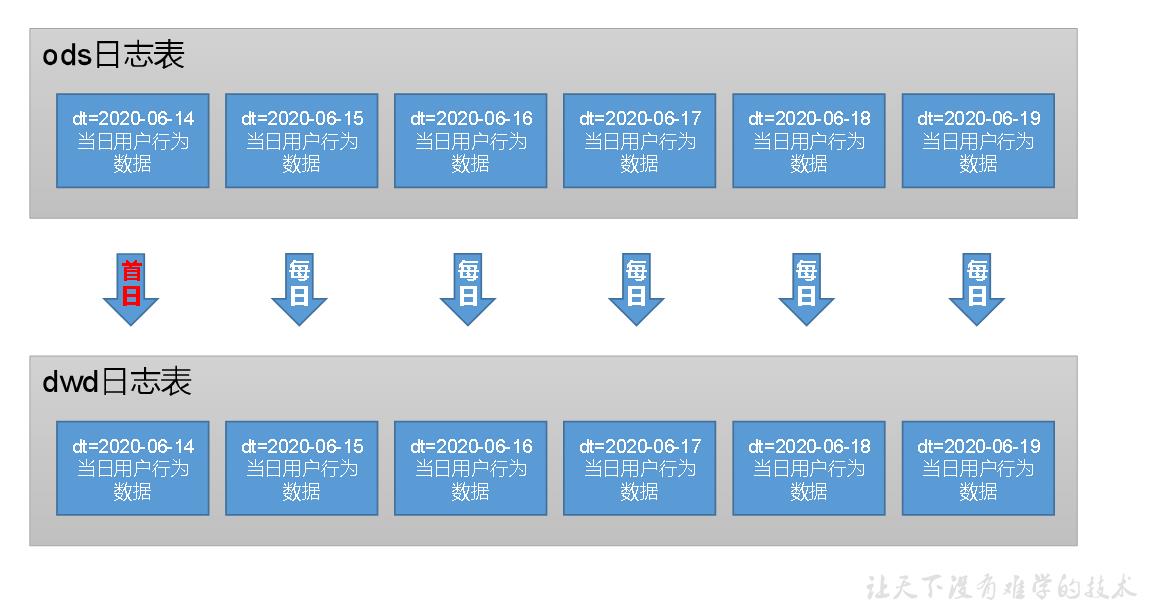
hive (gmall)>
insert overwrite table dwd_start_log partition(dt='2022-04-11')
select
get_json_object(line,'$.common.ar'),
get_json_object(line,'$.common.ba'),
get_json_object(line,'$.common.ch'),
get_json_object(line,'$.common.is_new'),
get_json_object(line,'$.common.md'),
get_json_object(line,'$.common.mid'),
get_json_object(line,'$.common.os'),
get_json_object(line,'$.common.uid'),
get_json_object(line,'$.common.vc'),
get_json_object(line,'$.start.entry'),
get_json_object(line,'$.start.loading_time'),
get_json_object(line,'$.start.open_ad_id'),
get_json_object(line,'$.start.open_ad_ms'),
get_json_object(line,'$.start.open_ad_skip_ms'),
get_json_object(line,'$.ts')
from ods_log
where dt='2022-04-11'
and get_json_object(line,'$.start') is not null;
3)查看数据
hive (gmall)>
select * from dwd_start_log where dt='2022-04-11' limit 2;
2.3.3、查看数据
hive (gmall)>
select * from dwd_start_log where dt='2022-04-11' limit 2;
2.4、页面日志表
页面日志解析思路:页面日志表中每行数据对应一个页面访问记录,一个页面访问记录应该包含日志中的公共信息和页面信息。先将所有包含page字段的日志过滤出来,然后使用get_json_object函数解析每个字段。
2.4.1、建表语句
DROP TABLE IF EXISTS dwd_page_log;
CREATE EXTERNAL TABLE dwd_page_log(
`area_code` STRING COMMENT '地区编码',
`brand` STRING COMMENT '手机品牌',
`channel` STRING COMMENT '渠道',
`is_new` STRING COMMENT '是否首次启动',
`model` STRING COMMENT '手机型号',
`mid_id` STRING COMMENT '设备id',
`os` STRING COMMENT '操作系统',
`user_id` STRING COMMENT '会员id',
`version_code` STRING COMMENT 'app版本号',
`during_time` BIGINT COMMENT '持续时间毫秒',
`page_item` STRING COMMENT '目标id ',
`page_item_type` STRING COMMENT '目标类型',
`last_page_id` STRING COMMENT '上页类型',
`page_id` STRING COMMENT '页面ID ',
`source_type` STRING COMMENT '来源类型',
`ts` bigint
) COMMENT '页面日志表'
PARTITIONED BY (`dt` STRING)
STORED AS PARQUET
LOCATION '/warehouse/gmall/dwd/dwd_page_log'
TBLPROPERTIES('parquet.compression'='lzo');
2.4.2、数据导入
hive (gmall)>
insert overwrite table dwd_page_log partition(dt='2022-04-11')
select
get_json_object(line,'$.common.ar'),
get_json_object(line,'$.common.ba'),
get_json_object(line,'$.common.ch'),
get_json_object(line,'$.common.is_new'),
get_json_object(line,'$.common.md'),
get_json_object(line,'$.common.mid'),
get_json_object(line,'$.common.os'),
get_json_object(line,'$.common.uid'),
get_json_object(line,'$.common.vc'),
get_json_object(line,'$.page.during_time'),
get_json_object(line,'$.page.item'),
get_json_object(line,'$.page.item_type'),
get_json_object(line,'$.page.last_page_id'),
get_json_object(line,'$.page.page_id'),
get_json_object(line,'$.page.source_type'),
get_json_object(line,'$.ts')
from ods_log
where dt='2022-04-11'
and get_json_object(line,'$.page') is not null;
2.4.3、查看数据
hive (gmall)>
select * from dwd_page_log where dt='2022-04-11' limit 2;
2.5、动作日志表
动作日志解析思路:动作日志表中每行数据对应用户的一个动作记录,一个动作记录应当包含公共信息、页面信息以及动作信息。先将包含action字段的日志过滤出来,然后通过UDTF函数,将action数组“炸开”(类似于explode函数的效果),然后使用get_json_object函数解析每个字段。
2.5.1、建表语句
DROP TABLE IF EXISTS dwd_action_log;
CREATE EXTERNAL TABLE dwd_action_log(
`area_code` STRING COMMENT '地区编码',
`brand` STRING COMMENT '手机品牌',
`channel` STRING COMMENT '渠道',
`is_new` STRING COMMENT '是否首次启动',
`model` STRING COMMENT '手机型号',
`mid_id` STRING COMMENT '设备id',
`os` STRING COMMENT '操作系统',
`user_id` STRING COMMENT '会员id',
`version_code` STRING COMMENT 'app版本号',
`during_time` BIGINT COMMENT '持续时间毫秒',
`page_item` STRING COMMENT '目标id ',
`page_item_type` STRING COMMENT '目标类型',
`last_page_id` STRING COMMENT '上页类型',
`page_id` STRING COMMENT '页面id ',
`source_type` STRING COMMENT '来源类型',
`action_id` STRING COMMENT '动作id',
`item` STRING COMMENT '目标id ',
`item_type` STRING COMMENT '目标类型',
`ts` BIGINT COMMENT '时间'
) COMMENT '动作日志表'
PARTITIONED BY (`dt` STRING)
STORED AS PARQUET
LOCATION '/warehouse/gmall/dwd/dwd_action_log'
TBLPROPERTIES('parquet.compression'='lzo');
2.5.2、创建UDTF函数
1)设计思路
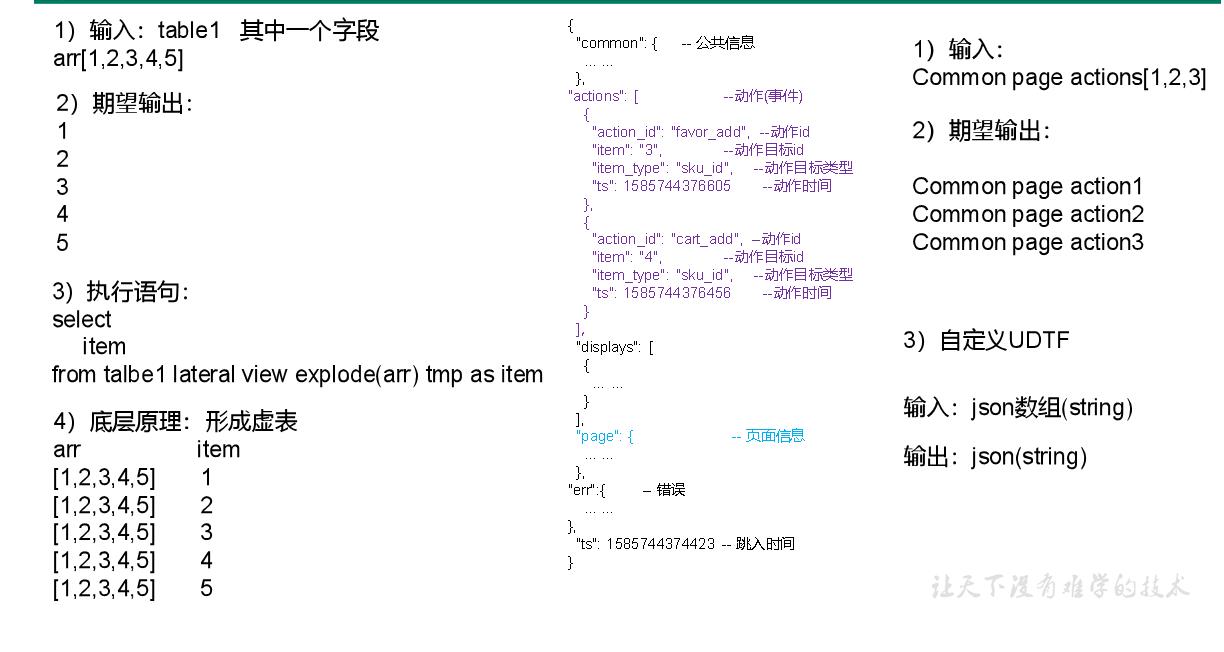
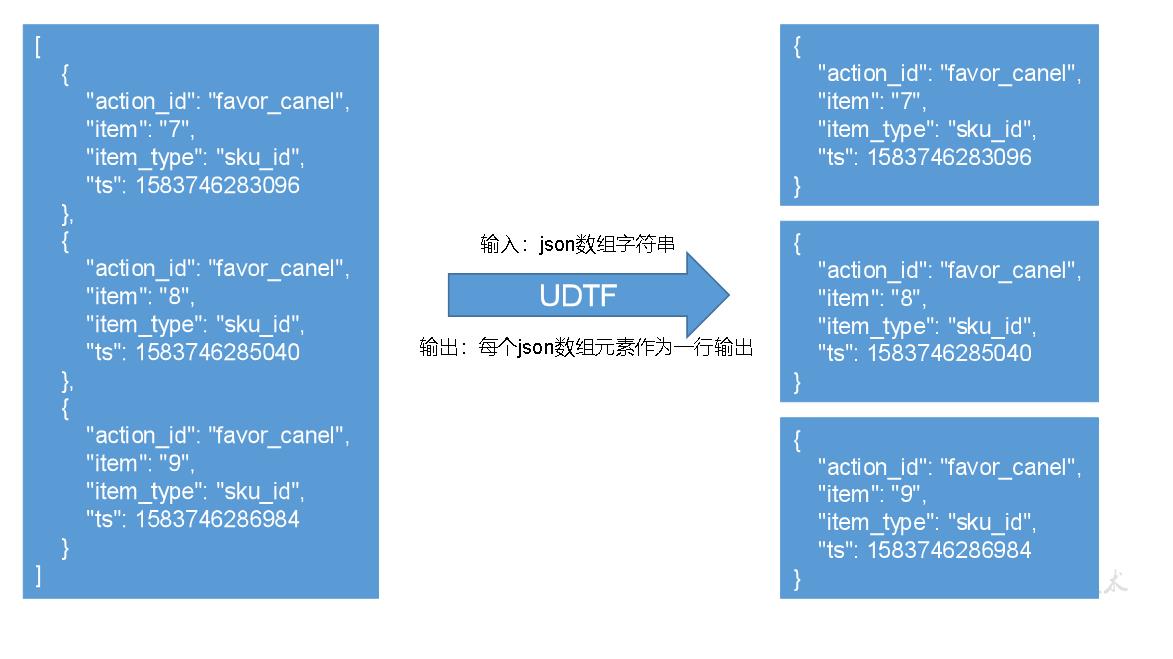
2)编写代码
(1)创建一个maven工程:hivefunction
(2)创建包名:com.atguigu.hive.udtf
(3)引入如下依赖
<dependencies>
<!--添加hive依赖-->
<dependency>
<groupId>org.apache.hive</groupId>
<artifactId>hive-exec</artifactId>
<version>3.1.2</version>
</dependency>
</dependencies>
(4)编码
package com.atguigu.hive.udtf;
import org.apache.hadoop.hive.ql.exec.UDFArgumentException;
import org.apache.hadoop.hive.ql.metadata.HiveException;
import org.apache.hadoop.hive.ql.udf.generic.GenericUDTF;
import org.apache.hadoop.hive.serde2.objectinspector.ObjectInspector;
import org.apache.hadoop.hive.serde2.objectinspector.ObjectInspectorFactory;
import org.apache.hadoop.hive.serde2.objectinspector.PrimitiveObjectInspector;
import org.apache.hadoop.hive.serde2.objectinspector.StructObjectInspector;
import org.apache.hadoop.hive.serde2.objectinspector.primitive.PrimitiveObjectInspectorFactory;
import org.json.JSONArray;
import java.util.ArrayList;
import java.util.List;
public class ExplodeJSONArray extends GenericUDTF
@Override
public StructObjectInspector initialize(ObjectInspector[] argOIs) throws UDFArgumentException
// 1 参数合法性检查
if (argOIs.length != 1)
throw new UDFArgumentException("explode_json_array 只需要一个参数");
// 2 第一个参数必须为string
//判断参数是否为基础数据类型
if (argOIs[0].getCategory() != ObjectInspector.Category.PRIMITIVE)
throw new UDFArgumentException("explode_json_array 只接受基础类型参数");
//将参数对象检查器强转为基础类型对象检查器
PrimitiveObjectInspector argumentOI = (PrimitiveObjectInspector) argOIs[0];
//判断参数是否为String类型
if (argumentOI.getPrimitiveCategory() != PrimitiveObjectInspector.PrimitiveCategory.STRING)
throw new UDFArgumentException("explode_json_array 只接受string类型的参数");
// 3 定义返回值名称和类型
List<String> fieldNames = new ArrayList<String>();
List<ObjectInspector> fieldOIs = new ArrayList<ObjectInspector>();
fieldNames.add("items");
fieldOIs.add(PrimitiveObjectInspectorFactory.javaStringObjectInspector);
return ObjectInspectorFactory.getStandardStructObjectInspector(fieldNames, fieldOIs);
public void process(Object[] objects) throws HiveException
// 1 获取传入的数据
String jsonArray = objects[0].toString();
// 2 将string转换为json数组
JSONArray actions = new JSONArray(jsonArray);
// 3 循环一次,取出数组中的一个json,并写出
for (int i = 0; i < actions.length(); i++)
String[] result = new String[1];
result[0] = actions.getString(i);
forward(result);
public void close() throws HiveException
3)创建函数
(1)打包
(2)将hivefunction-1.0-SNAPSHOT.jar上传到h102的/opt/module,然后再将该jar包上传到HDFS的/user/hive/jars路径下
hadoop fs -mkdir -p /user/hive/jars
hadoop fs -put hivefunction-1.0-SNAPSHOT.jar /user/hive/jars
(3)创建永久函数与开发好的java class关联
create function explode_json_array as 'com.atguigu.hive.udtf.ExplodeJSONArray' using jar 'hdfs://h102:8020/user/hive/jars/hivefunction-1.0-SNAPSHOT.jar';
(4)注意:如果修改了自定义函数重新生成jar包怎么处理?只需要替换HDFS路径上的旧jar包,然后重启Hive客户端即可。
2.5.3、数据导入
insert overwrite table dwd_action_log partition(dt='2022-04-11')
select
get_json_object(line,'$.common.ar'),
get_json_object(line,'$.common.ba'),
get_json_object(line,'$.common.ch'),
get_json_object(line,'$.common.is_new'),
get_json_object(line,'$.common.md'),
get_json_object(line,'$.common.mid'),
get_json_object(line,'$.common.os'),
get_json_object(line,'$.common.uid'),
get_json_object(line,'$.common.vc'),
get_json_object(line,'$.page.during_time'),
get_json_object(line,'$.page.item'),
get_json_object(line,'$.page.item_type'),
get_json_object(line,'$.page.last_page_id'),
get_json_object(line,'$.page.page_id'),
get_json_object(line,'$.page.source_type'),
get_json_object(action,'$.action_id'),
get_json_object(action,'$.item'),
get_json_object(action,'$.item_type'),
get_json_object(action,'$.ts')
from ods_log lateral view explode_json_array(get_json_object(line,'$.actions')) tmp as action
where dt='2022-04-11'
and get_json_object(line,'$.actions') is not null;
2.5.4、查看数据
select * from dwd_action_log where dt='2022-04-11' limit 2;
2.6、曝光日志表
曝光日志解析思路:曝光日志表中每行数据对应一个曝光记录,一个曝光记录应当包含公共信息、页面信息以及曝光信息。先将包含display字段的日志过滤出来,然后通过UDTF函数,将display数组“炸开”(类似于explode函数的效果),然后使用get_json_object函数解析每个字段。
2.6.1、建表语句
DROP TABLE IF EXISTS dwd_display_log;
CREATE EXTERNAL TABLE dwd_display_log(
`area_code` STRING COMMENT '地区编码',
`brand` STRING COMMENT '手机品牌',
`channel` STRING COMMENT '渠道',
`is_new` STRING COMMENT '是否首次启动',
`model` STRING COMMENT '手机型号',
`mid_id` STRING COMMENT '设备id',
`os` STRING COMMENT '操作系统',
`user_id` STRING COMMENT '会员id',
`version_code` STRING COMMENT 'app版本号',
`during_time` BIGINT COMMENT 'app版本号',
`page_item` STRING COMMENT '目标id ',
`page_item_type` STRING COMMENT '目标类型',
`last_page_id` STRING COMMENT '上页类型',
`page_id` STRING COMMENT '页面ID ',
`source_type` STRING COMMENT '来源类型',
`ts` BIGINT COMMENT 'app版本号',
`display_type` STRING COMMENT '曝光类型',
`item` STRING COMMENT '曝光对象id ',
`item_type` STRING COMMENT 'app版本号',
`order` BIGINT COMMENT '曝光顺序',
`pos_id` BIGINT COMMENT '曝光位置'
) COMMENT '曝光日志表'
PARTITIONED BY (`dt` STRING)
STORED AS PARQUET
LOCATION '/warehouse/gmall/dwd/dwd_display_log'
TBLPROPERTIES('parquet.compression'='lzo');
2.6.2、数据导入
insert overwrite table dwd_display_log partition(dt='2022-04-11')
select
get_json_object(line,'$.common.ar'),
get_json_object(line,'$.common.ba'),
get_json_object(line,'$.common.ch'),
get_json_object(line,'$.common.is_new'),
get_json_object(line,'$.common.md'),
get_json_object(line,'$.common.mid'),
get_json_object(line,'$.common.os'),
get_json_object以上是关于数仓搭建DWD层的主要内容,如果未能解决你的问题,请参考以下文章